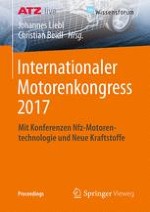2017 | OriginalPaper | Buchkapitel
FEV ECObrid – a 48V mild hybrid concept for passenger car Diesel engines
verfasst von : Joschka Schaub, Christian Frenken, Bastian Holderbaum, Philip Griefnow, Rene Savelsberg, Olivier Coppin
Erschienen in: Internationaler Motorenkongress 2017
Verlag: Springer Fachmedien Wiesbaden
Aktivieren Sie unsere intelligente Suche, um passende Fachinhalte oder Patente zu finden.
Wählen Sie Textabschnitte aus um mit Künstlicher Intelligenz passenden Patente zu finden. powered by
Markieren Sie Textabschnitte, um KI-gestützt weitere passende Inhalte zu finden. powered by
Powertrain electrification is a key to compliance with future exhaust emission and CO2 limits. Besides conventional 12 V systems and high-voltage hybrid architectures, 48 V mild hybridization offers significant fuel economy potential and advanced emission control without the need for an entire powertrain redesign. The 48 V power net enables high recuperation capability, improved stop-start functionalities as well as electrical boosting by an electric compressor (e-Compressor) or belt-driven starter generator (BSG).The paper summarizes the key findings of a joint project between FEV and Valeo investigating the potential of mild hybridization and electrical boosting for a downsized passenger car Diesel engine. The considered engine is the well-known FEV HECS concept in its third generation, consisting of a 1.6-liter 4-cylinder engine with single stage VNT turbocharger, e-Compressor, 48 V BSG and dual loop EGR. The engine has been installed in a D-segment vehicle with a dual-voltage electrical system and an advanced model-based engine control unit (ECU) developed by FEV. The paper focuses on the vehicle set-up and performance in transient emission test cycles and under real world driving conditions. In addition, electrical energy management was considered to ensure an efficient power distribution.
